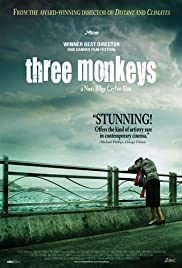
UC MAYMON (THE THREE MONKEYS)
Turkey, 2008, 97 minutes, Colour.
Directed by Nure Bilge Ceylan.
Uzak (Distance) was a Cannes award winner and a well-made study of loneliness in the Turkish countryside and in Istanbul. Climates was also a hit on the festival circuit. Well filmed and acted, for many (including this reviewer) it was a rather slow and sometimes tedious look at a marriage and its difficulties. While The Three Monkeys is not tedious, it is melodrama material with a familiar enough plot. (If the same screenplay had been made in English, it may well have been dismissed as rather obvious.)
However, it opens well with a hit-run accident where a politician wants to avoid any publicity and pays one of his workers to go to prison for him, paying his family a salary each month and a lump sum at the end of the sentence. In the meantime, the worker’s wife is at home with her late teenage son and has a relationship with the politician which the son discovers and is angry with his mother. Things come to the anticipated head when the prisoner is released and comes home.
The politician is as loathsome as expected. The prisoner is affected by some macho brutality. The son tends to mope all the time so it is hard to be as sympathetic to him as the screenplay wants. The wife, however, is a woman of vitality and verve despite what she does. When she is on screen, the film is alive.
The Turkish locations and atmosphere are interesting but the film offers only average interest.
1. The director and his work, acclaim? A Turkish story? Atmosphere?
1.The title, the monkeys seeing, hearing and speaking no evil? How did it apply to the behaviour of the three central characters?
2.Istanbul, the home, the teahouse, the surroundings, the water, the prison? The musical score?
3.The opening, the driver nodding, the accident, the couple stopping and giving information to the police?
4.The plan, the employee agreeing to go to prison, his wife knowing, his son? The payments monthly? The decision to ask money for the car?
5.The man in prison, only three visits from his son, not from his wife? Getting out, seeing the new car, suspicions? Relationship with his son, wanting him to pass the exams? His wife, his brutality towards her? The truth, the confrontation? Saying that she should kill herself, then urging her not to? His decision to pay somebody else to go to prison?
6.The wife, ordinary, her vitality, relationship with her son, concerns about him, the car money, the affair, the lies, her being upset, going to Servet’s house, the phone calls, the sexual brutality of her husband, the suggestion that she kill herself, not?
7.The son, age, morose, exam failure, in his room, the job at the crèche, wanting the car, the visits to prison, going to socials, the dance? Discovering the truth about his mother, the confrontation, her lies? His being sick at the station? His decision not to tell his father the truth? Meeting his father, the new car? Killing Servet?
8.Servet, the political background, paying off for the prison sentence, the affair, his anger at the woman being at his house, his death?
9.The teahouse, the friend, the substitute going to prison? His being paid?
10.The blend of drama and melodrama? The director saying that he wanted to explore evil in banality?